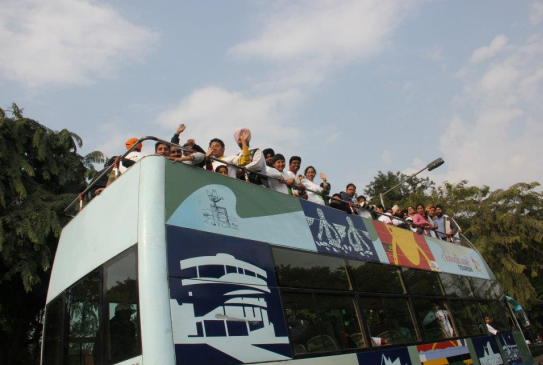By Kierra Enns (Contributor) – Email
Print Edition: January 8, 2014
Every student inevitably seeks out opportunities to test what they learn in the classroom. For four UFV students, that test came in the form of a three-month internship in Chandigarh, India.
Jessica Tourand, Alyssa Bougie, Ashley Hayes, and Sara Thiessen work in poverty-stricken slums on the outskirts of the bustling city, gaining experience by working with and administrating a non-governmental organization (NGO) called Developing Indigenous Resources (DIR). Tourand explains the NGO focuses on “empowering local people to solve their own problems.”
DIR is heavily involved in community health programs in which community members are educated as health promoters so that they can, in turn, educate their neighbours. Tourand notes that they work in two informal settlements outside Chandigarh and their target groups include pregnant women, women who have just given birth, and children under five.
The specific internship was funded for three months, but UFV has been involved with Chandigarh for many years, their role having changed over time.
In the past, interns from UFV have been involved in a specific initiative: a green roof project, which was in collaboration with Panjab University in Chandigarh. Coming into the NGO, Tourand, Hayes, Thiessen, and Bougie were given specific tasks, but as the internship has gone on and as opportunities have presented themselves, they have all ended up working on other projects.
Tourand focuses on grant and proposal writing, as well as coordinating an independent evaluation of DIR’s health program. Hayes works on online marketing strategies, and is the resident photographer/videographer. Thiessen is involved in DIR’s preschool, School With a Difference. She has been able to renovate the school and improve the teachers’ skill set. Bougie started off doing a survey and evaluation of DIR’s Green Roof project and has since been working on improving the agricultural programs at DIR, as well as creating a rainwater collection system.
As a collective team, they’ve all worked on a new initiative which gives children around the slum the opportunity to participate in games and educational activities, as well as collaborated to produce the 2013 annual report for DIR.
Tourand explains that their success is directly related to the support they have found.
“It also helps that the people around us have been so welcoming. We’ve certainly been able to develop our communication skills,” she says. “One of the biggest things to adjust to is the respect and attention that we get on a daily basis. It’s very strange to be called ‘ma’am’ and hard to get people to stop, especially our co-workers at DIR. People are so accommodating here — which is wonderful — but it can be strange to interact with.”
There are many ways in which UFV students can get involved with DIR, Chandigarh, or similar internships.
“DIR is always looking for contributions,” they say. “If someone were interested in interning in India, the best place to look would be the geography department and look for Garry Fehr. The man is a wealth of information and also coordinates the internships.”
They go on to describe what it takes to successfully intern in India.
“The ideal candidate for an internship in India has to be a lot of things. Mainly, adaptable and open-minded. So many times you look around and think, ‘What am I doing right now?’ and you sort of just have to accept it and turn it into a good experience. It’s also important to be friendly and willing to try new things. An intern needs to have thick skin.”
When they aren’t working, the interns have been able to absorb some of the culture they’ve been exposed to on a daily basis.
“The everyday experiences have actually been some of the most amazing. Traffic in India is something that definitely takes getting used to. Driving into oncoming traffic, the absence of lanes, and the mix of [vehicles] makes driving quite the experience,” they say. “Our boss joked that if you stopped thinking of driving as a mode of transportation and, instead, an individual competitive sport, then it can become quite enjoyable.
“Being here during the festival season, and especially Diwali, has been amazing. The entire night, there were crackers and fireworks going off. Made conversation difficult! We tried, at first, to yell over the din, but eventually gave up, sat back, and enjoyed the spectacle of it all.”


